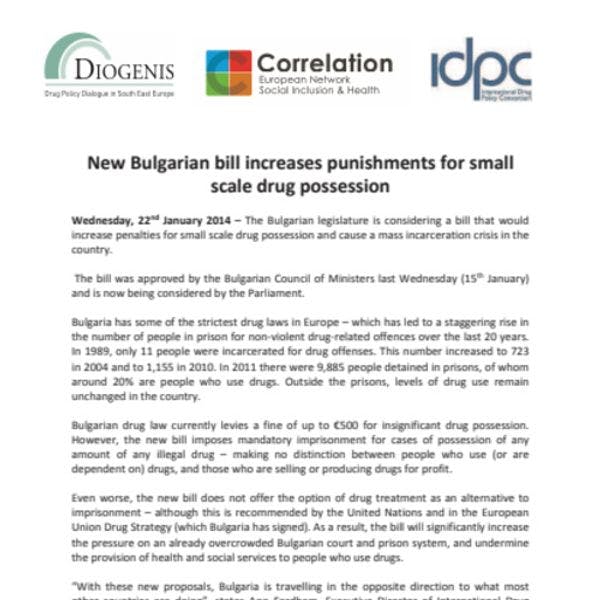New Bulgarian bill increases punishments for small scale drug possession
Wednesday, 22nd January 2014 – The Bulgarian legislature is considering a bill that would increase penalties for small scale drug possession and cause a mass incarceration crisis in the country.
The bill was approved by the Bulgarian Council of Ministers last Wednesday (15th January) and is now being considered by the Parliament.
Bulgaria has some of the strictest drug laws in Europe – which has led to a staggering rise in the number of people in prison for non-violent drug-related offences over the last 20 years. In 1989, only 11 people were incarcerated for drug offenses. This number increased to 723 in 2004 and to 1,155 in 2010. In 2011 there were 9,885 people detained in prisons, of whom around 20% are people who use drugs. Outside the prisons, levels of drug use remain unchanged in the country.
Bulgarian drug law currently levies a fine of up to €500 for insignificant drug possession. However, the new bill imposes mandatory imprisonment for cases of possession of any amount of any illegal drug – making no distinction between people who use (or are dependent on) drugs, and those who are selling or producing drugs for profit.
Even worse, the new bill does not offer the option of drug treatment as an alternative to imprisonment – although this is recommended by the United Nations and in the European Union Drug Strategy (which Bulgaria has signed). As a result, the bill will significantly increase the pressure on an already overcrowded Bulgarian court and prison system, and undermine the provision of health and social services to people who use drugs.
“With these new proposals, Bulgaria is travelling in the opposite direction to what most other countries are doing”, states Ann Fordham, Executive Director of International Drug Policy Consortium (IDPC). “They are going backwards, while the rest of Europe is modernising their drug laws and implementing health-based approaches to drugs – policies that support, rather than punish, people who use drugs.”
Civil society organisations in Bulgaria and abroad have expressed their serious concerns about the bill, and have sent letters to the Ministry of Justice. However, the bill has been fast-tracked through the approval processes, ignoring inputs from civil society and even the National Council on Drugs.
“Providing drug treatment as an alternative to imprisonment is best practice around the world” states Anna Lyubenova, from the Initiative for Health Foundation in Bulgaria. “But it is not included in this bill, despite recommendations from the National Council on Drugs. This is a wasted opportunity”.
In a statement presented to the Ministry of Justice, several Bulgarian NGOs claimed that, “The proposed bill does not offer any progress… There has been public debate about the necessity to distinguish the simple user from the narcotic drugs dealer. The bill fails to do this”. Another statement noted, “The bill creates a real danger for young people to… be treated as dangerous criminals”. National and international groups are now lobbying the Bulgarian Parliament to seek revision of this bill in order to better reflect the global evidence of what does – and what does not – work in terms of drug policy.
Media contacts for interviews:
- Rada Naslednikova, Executive Director of Center “Proekt Peperuda Sofia”; tel +359 878 146 246, email: rada.naslednikova@gmail.com
- Ann Fordham, Executive Director of International Drug Policy Consortium; tel +44 (0) 20 7324 2975, email: afordham@idpc.net
More resources:
Diogenis report: Drug policy and drug legislation in South East Europe.
Petition against the unjust and risky changes in the Penal Code
Support. Don’t Punish.
HCLU video: Bulgaria: On the Dark Side of Drug Policy
Keep up-to-date with drug policy developments by subscribing to the IDPC Monthly Alert.
Topics
Regions
Related Profiles
- Correlation – European Harm Reduction Network
- Diogenis
- International Drug Policy Consortium (IDPC)
